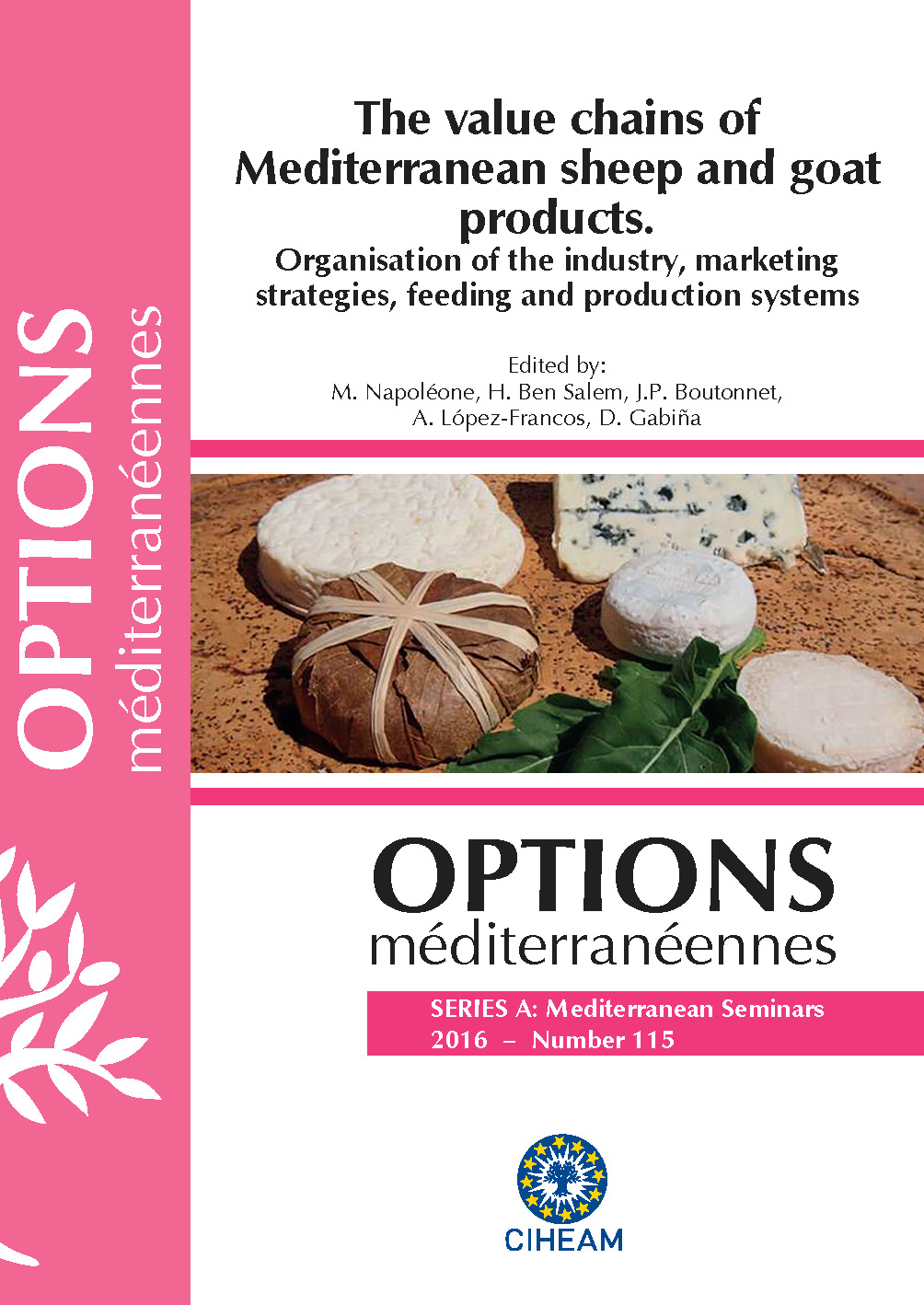| Article précédent | p. 281-285 | Article suivant |
Plasma immunoglobulins levels in dry and lactating goats fed diets containing tomato and cucumber waste fruits
In the last years there has been an increasing interest in the use of horticulture wastes in ruminants feeding. Fruits and vegetables are good sources of biologically active phytochemicals which could modulate host immunity. Two experiments were conducted to analyse the effects of diets including wastes of tomato and cucumber fruits on plasma IgA and IgG levels in goats. Four experimental diets were formulated and tested in a Latin square experimental design. The control diet (CON) consisted of alfalfa hay plus concentrate in a 1:1 ratio and the other three diets were formulated for dry and lactating goats by replacing 50 or 35%, respectively, of the concentrate with feed blocks including wastes of tomato fruits (TOM), cucumber (CUC) or barley (BAR). In Experiment 1, four dry non-pregnant rumen-cannulated goats (32.1 ± 5.52 kg BW) were used, and in Experiment 2 experimental animals were eight lactating goats (39.4 ± 5.39 kg BW). Blood samples were taken from each animal after 39 days of adaptation to the corresponding diet. Plasma samples from both experiments were analyzed for IgA and IgG using commercial ELISA kits. In Experiment 1, there were no differences between diets in plasma immunoglobulin levels (P>0.73 and 0.95 for IgA and IgG, respectively). No effect of diet was either observed in Experiment 2 (P=0.47 and 0.45 for IgA and IgG, respectively). The results indicate that including wastes of tomato and cucumber fruits in the diets of goats did not affect animals’ plasma immunoglobulin levels.
Dans les dernières années il y a eu un intérêt croissant pour l’utilisation des déchets de l’horticulture dans l’alimentation des ruminants. Fruits et plantes sont de bonnes sources de composés phytochimiques biologiquement actives qui pourraient moduler l’immunité de l’hôte. Deux expériences ont été menées pour analyser les effets de l’alimentation incluant des déchets de fruits de tomates et de concombres dans l’alimentation des chèvres sur leurs niveaux plasmatiques d’IgA et IgG. Quatre régimes expérimentaux ont été formulés et testés suivant un design expérimental en carré latin. Le régime contrôle (CON) était composée de foin de luzerne, plus concentré dans un rapport 1 : 1 et les trois autres régimes étudiés dans des chèvres secs et allaitantes en remplaçant 50 ou 35%, respectivement, du concentré avec des blocs d’alimentation qui incluaient de fruits de tomate (TOM), concombre (CUC) ou de l’orge (BAR), respectivement). Dans l’expérience 1, quatre chèvres sèches et canulées dans le rumen (32,1 ± 5,52 kg BW) ont été nourris avec les quatre diètes étudies. Dans l’expérience 2, les animaux expérimentaux étaient huit chèvres en lactation (39,4 ± 5,39 kg BW). Des échantillons de sang ont été prélevés sur chaque animal après 39 jours d’adaptation au régime correspondant. Les échantillons de plasma des deux expériences ont été analysés pour IgA et IgG en utilisant des kits ELISA commerciaux. Dans l’expérience 1, il n’y avait pas de différences entre les régimes dans le niveau d’immunoglobulines (P>0,73 et 0,95 pour les IgA et les IgG, respectivement). No effet du régime a également été observée dans l’expérience 2 (P = 0,47 et 0,45 pour les IgA et IgG, respectivement). Les résultats indiquent que les régimes avec des blocs incluant les déchets de tomates et de concombres n’a pas affecté les niveaux d’immunoglobuline de plasma des animaux.
- [ Afficher ]
- [ Télécharger ]
- [ Exporter la citation ]
Vous pouvez télécharger la citation au format :
- [ Imprimer ]
-
Mots-clés
CHEVRECiter cet article
Romero-Huelva M., Carro M.D., Molina Alcaide E. Plasma immunoglobulins levels in dry and lactating goats fed diets containing tomato and cucumber waste fruits. In : Napoléone M. (ed.), Ben Salem H. (ed.), Boutonnet J.P. (ed.), López-Francos A. (ed.), Gabiña D. (ed.). The value chains of Mediterranean sheep and goat products. Organisation of the industry, marketing strategies, feeding and production systems. Zaragoza : CIHEAM, 2016. p. 281-285. (Options Méditerranéennes : Série A. Séminaires Méditerranéens; n. 115). Joint Seminar of the Subnetworks on Nutrition and on Production Systems of the FAO-CIHEAM Network for Research and Development in Sheep and Goats, 2015/06/16-18, Montpellier (France) . http://om.ciheam.org/om/pdf/a115/00007289.pdf



